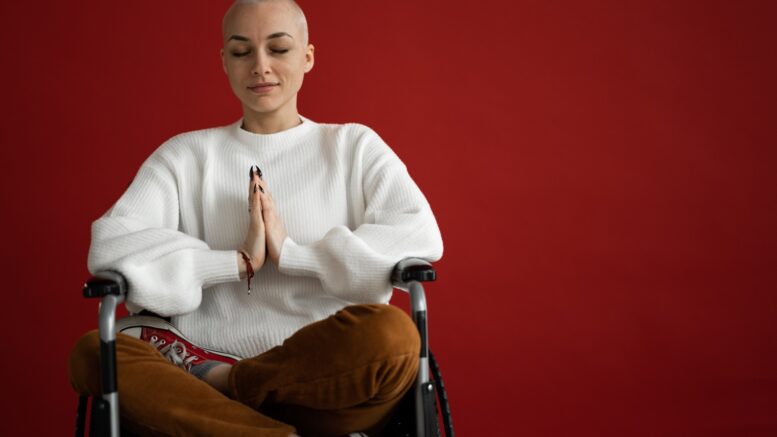Whilst there are many physical side effects of cancer treatment, hair loss is arguably one of the symptoms which affects people’s lives the most.
It’s a drastic change in appearance for many patients which can affect their confidence. Such a visible indicator can also be a reminder of everything they have been through. In addition, it can lead friends, family and acquaintances to ask questions that they might not be ready for and may find upsetting. However, hair loss is a very common experience through cancer treatment and a side effect that often continues into recovery.
If you are wondering if there is anything you can do to encourage your hair to grow back, you aren’t alone. The diet that you eat can play a significant role in your recovery, especially when it comes to promoting hair growth. Whilst hair usually grows back on its own within a year, concentrating on your diet and nourishing your body can help.
In this guide, a cancer dietician from Perci Health outlines which foods can support hair growth after cancer and explains why, delving into the effects that vitamins, minerals and other nutrients have on hair growth.
Foods that support hair growth
After cancer treatment, it’s a good idea to eat a balanced, healthy diet so that your body has everything it needs to recover and build strength. To promote hair growth after chemo, you should try to incorporate the following foods:
- Eggs
- Seafood and oily fish
- Vegetables including leafy greens, Brussels sprouts, broccoli, and peppers
- Fruit including oranges, grapefruit, berries, bananas, and kiwis
- Red meat
- Whole-grain foods including cereal
- Beans and pulses
- Nuts and seeds
What nutrients encourage hair growth after cancer?
The reason that the aforementioned foods are beneficial is that they all contain different nutrients that are known to have a positive impact on hair growth. These nutrients include vitamins, minerals, and proteins.
Vitamin A
Vitamin A keeps our skin healthy by supporting the secretion of sebum. Sebum is an oily substance that moisturises the scalp, thus lessening the likelihood of damage and encouraging hair growth. As there is some evidence that suggests too much vitamin A can lead to hair loss, you should obtain it through foods rather than supplements to reduce this risk.
Vitamin A is found in dairy products, eggs, oily fish, liver, and liver products such as pate. However, liver is a particularly rich source of vitamin A, so it’s advised that you only eat liver or liver products once a week. If you are pregnant, you should refrain from eating liver entirely.
Vitamin C
Vitamin C is a powerful antioxidant. It acts as protection for cells against the damage caused by free radicals in the body and helps in building collagen which is essential for hair growth. It’s found in an array of fruit and vegetables. As well as oranges, try to include strawberries, peppers, potatoes, and Brussels sprouts in your diet to maximise your intake.

Iron
Iron helps your body produce the protein haemoglobin. Haemoglobin carries oxygen to your body’s cells to help them grow and repair, and this includes your hair cells.
Animal products and seafood are good sources of iron. However, if you follow a plant-based diet, fortified breakfast cereals, dried fruit and pulses are great alternatives.
It’s worth noting that polyphenols found in tea and coffee can inhibit iron absorption, so it’s advised to wait an hour after eating before drinking tea or coffee, especially if you are known to have an iron deficiency. However, vitamin C has been shown to enhance the absorption of iron so try a squeeze of lemon or lime in your glass of water as an easy way to boost your intake.
Protein
Protein is crucial for the growth and repair of tissue. As hair itself is made of a protein called keratin, a good intake will support strong and healthy hair regrowth. Aim to include a lean source of protein, such as eggs, fish, dairy, pulses, or meat in each meal.
Biotin
Biotin, or vitamin B7, is always the go-to vitamin when talking about healthy hair, skin, and nails. However, no solid clinical evidence proves that taking a biotin supplement after chemo will improve hair growth and that only those with a biotin deficiency may see any benefits. We require very small amounts of biotin, but it is found in a wide range of foods including eggs, whole-grain cereals, seafood, and dark green leafy vegetables.
Water
Try to drink at least two litres of water per day to support your body’s recovery. Ensuring your skin is well hydrated also reduces the risk of damage to your hair during its growth phase. If you find drinking plain water difficult, you can add squash, slices of your favourite fruit or use herbal teas to make it more palatable.
If you would like personalised dietary support or would just like more advice and information about aspects of living with and beyond cancer, Perci Health offers virtual sessions with friendly and knowledgeable cancer specialists.
